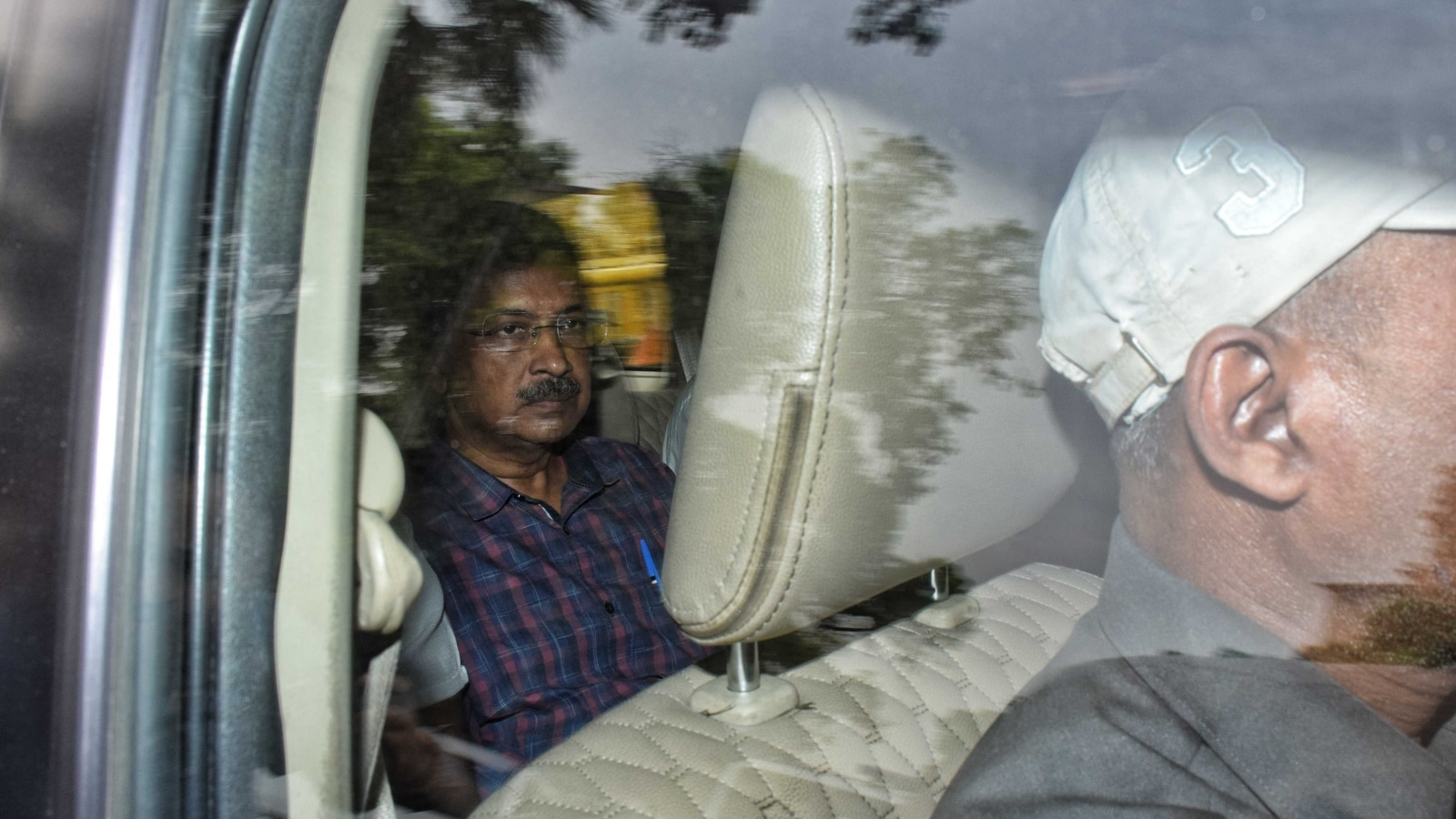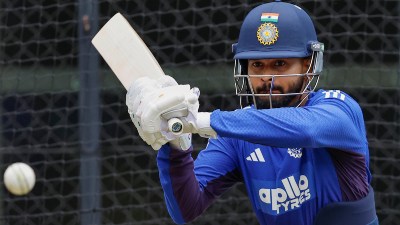ED opposes Kejriwal plea: Can’t commit crime and claim immunity citing elections
Bizarre: Arvind Kejriwal's lawyer Singhvi on ED drawing parallels with murder, act of terrorist
 Arvind Kejriwal being taken from ED office to Rouse Avenue Court, on Thursday, March 28, 2024. (Express photo by Abhinav Saha)
Arvind Kejriwal being taken from ED office to Rouse Avenue Court, on Thursday, March 28, 2024. (Express photo by Abhinav Saha)Opposing Chief Minister Arvind Kejriwal’s plea against his arrest in the Delhi excise policy case and subsequent remand in custody, the Enforcement Directorate told the Delhi High Court Wednesday that “criminals, undertrials have no business to say that they will commit the crime and get immunity on the grounds that elections are coming”.
The ED’s submissions were countered by Kejriwal’s counsel and the High Court, after hearing the matter for around four hours, reserved its verdict.
Appearing for the ED before the single-judge bench of Justice Swarana Kanta Sharma, Additional Solicitor General SV Raju said, “Suppose a political person commits a murder just two days before the elections. He can’t be arrested? Does the Basic Structure of the Constitution come into play? Basic Structure of the Constitution is not to be applied in this manner. Criminals are supposed to be arrested and put in jail. If they are arrested and put in jail, there is no infringement of Basic Structure. It is an absolutely absurd argument. I may commit murder, police come to arrest me and I say no you can’t arrest me, elections are coming. What type of argument is this that otherwise Basic Structure will get infringed.”
“…If a person is not a politician you put him under jail. Aam aadmi has to go behind bars irrespective of elections… But I am a Chief Minister, so you can’t put me behind the bars even if I have committed a heinous crime, even if I have committed an economic crime. The SC has said that economic crime is worse than murder, this is done in a cold blooded manner whereas murder is done in the heat of the moment. Therefore, I will loot the country, I will take kickbacks but don’t touch me because elections are coming. If you touch me during elections, the Basic Structure is violated. What type of Basic Structure is this?”
“Take the case of a terrorist who is a politician who has, say, blown up an Army vehicle. But he says I want to stand in the election so you can’t touch me. What kind of argument is this?”, Raju said.
Responding to these submissions, Senior Advocate Abhishek Manu Singhvi, appearing for Kejriwal, called these examples inappropriate.
“The examples were bizarre. The delicious answer was given by my friend that this was a long-time-ago scam. So a long-time-ago scam is equal to a heinous crime done in elections for which arrest must happen right now? Is it a heinous crime which justifies the use (of the words)… ‘an Army vehicle being blown’, ‘of terrorist’? Did any of these heinous crimes happen after notification of elections? Answer is clearly no. Am I seeking a Ninth Schedule exemption from arrest, it is my submission,” Singhvi said.
At this stage, the HC said that Raju was only giving an example.
“We are prepared to go back to the court’s recording on this to say that he said so,” Singhvi said regarding the examples given by the ED.
The ASG countered: “Are you recording the court proceedings without the court’s permission? A large number of people heard you.”
Singhvi said, “I am only saying that if you deny it, the court’s live streaming will show it.”
“You are changing your statement, that’s not fair,” Raju said.
Singhvi said, “They also heard you before me. I don’t change statements. I am talking of your statements of heinous crimes, blowing vehicles. My point is if a man, a Chief Minister, blows up an Army vehicle in the middle of elections, he should be arrested? But is that a fair analogy (in this case)?”.
To this, Raju said he “never used the term Chief Minister” and he used the term “politician”.
On the allegation of proceeds of crime, Singhvi said, “ED has said that we are a standalone statute and money laundering a standalone offence. Therefore, what is the standalone element of PMLA? Suppose a bribe giver is caught on the spot while giving a bribe to a bribe receiver. If money is caught on the spot, it is either Prevention of Corruption Act or Income tax offence. Can ED jump into this and say that I still get jurisdiction, despite there being no proceeds of crime? There is not one full stop, comma, evidence that there is proceeds of crime qua petitioner accused Kejriwal.”
Raju had argued that rule of law means that laws apply equally to all citizens and institutions of the state and mandates objective and free treatment to all and is a check on arbitrary use of power. He had said that the defence cannot be looked at this stage and whether “statements” made against Kejriwal by witnesses “are to be believed or not is a matter of trial”.
To this, Singhvi said, “Totality of arrest basis is his awareness of conspiracy, based on the same statements… I want to ask how awareness of conspiracy becomes a valid ground for the offence of Section 3 PMLA. It is turning the PMLA on its head.”
On Singhvi’s argument that the rigours placed on Section 19 of PMLA, which pertains to power to arrest, is high because the threshold of granting bail under Section 45 of the Act is also very high, Raju said that the same will not apply here “at this stage” because it is not a bail application.
Raju said that as far as Section 70 (offences by companies) of PMLA is concerned, a person can be accused if he is actually involved in the offence but if somebody else has committed an offence like a company then you can’t be held responsible unless there is provision of vicarious liability.
“This is found in Section 70, PMLA. We have established that evidence shows that kickbacks were used for the election campaign of AAP in Goa. Beneficiary was AAP, and an offence was committed by it… Our case is that AAP is an ‘association of individuals’. A company’s definition is widened for the purpose of Section 70, PMLA to not only include registered companies, as well as association of individuals. You may not be a company strictly but may be deemed to be a company if you are an association of people. Therefore, AAP is a company,” Raju said.
He then referred to the Representation of the People Act to submit that as per Section 2(f), a political party means an association of individuals. Therefore, AAP would be considered as a company for the purpose of Section 70 under the PMLA, there can’t be a dispute about it, Raju said.
“Kejriwal was in-charge of the conduct of the party, we have evidence for it we have shown… He takes all final decisions in respect of major issues. Therefore, he is responsible for the affairs of the party. Therefore if the offence is committed by the company, he is responsible… By company I mean AAP… We have demonstrated that Kejriwal was in-charge of the affairs of the company (AAP) at the relevant time when kickbacks were taken, when money laundering was done,” Raju said.
Singhvi countered Raju’s submission of the CM’s plea being a bail plea guised as a writ petition, submitting that it remains a petition challenging “illegal arrest” and to bring in “deliberately issues of bail, quashing is uncalled for”.
With respect to Raju’s submission that cognizance of the ED’s prosecution complaints have been taken by the trial court, Singhvi submitted that cognizance happened one-and-half years ago and has no relevance to the CM’s arrest, which took place over 10 days ago and his petition before the HC is challenging the arrest.
The HC later reserved its verdict.







